We went to a neighboring town to order balloons for my son’s upcoming birthday. We yelped a place for dinner afterward and found a local pizzeria nearby the party store. As we sat down at our table eagerly anticipating the 5-star pizza, our little family unwittingly became witnesses to a BIG family drama at the next table.
We tried not to listen. I made several attempts at redirecting my son’s attention because he hasn’t yet learned not to stare. What was going on at the adjoining table, separated by a low brick wall that only gave the illusion of privacy, was far more interesting to him than my contrived attempts of dinner conversation.
And we weren’t the only ones who were reluctant eavesdroppers, pretty much everyone on that side of the restaurant heard the drama.
I know what you’re thinking — I hope a parenting expert with blog doesn’t sit next to me during one of my family dramas and then write about it!! So here are a few ground rules before I tell you what I overheard: I’m using no names, I’m changing some of the details, and I’m not judging this mama or how she handled the situation.
Actually, this mama inspired me and gave me hope for what positive parenting tweens and teens might look like when my son is older.
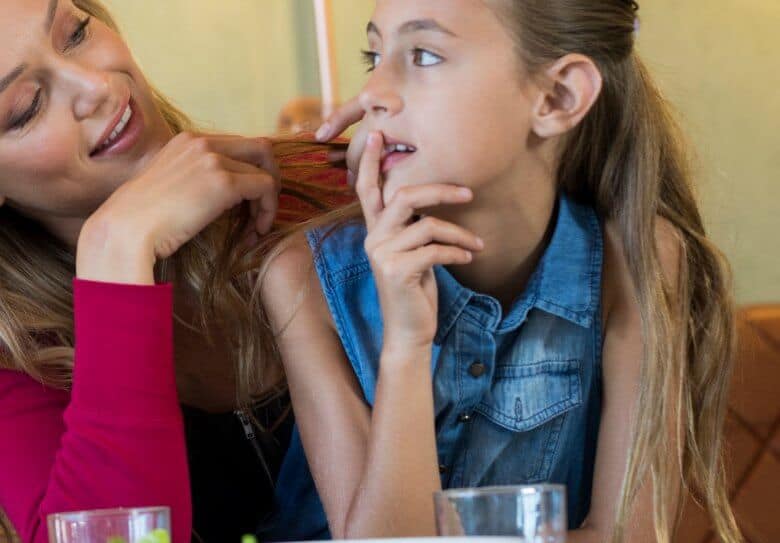
The Story
Something had happened concerning the tween daughter and her friend at school. It seemed that the daughter was responsible for inviting her friend to some kind of event. And because the daughter didn’t follow through on her responsibility, the friend was not able to come.
The daughter was crying — a soft sob. The son, who was probably a year or two younger, sat quietly. The mom was clearly upset. The gist of what the mom was saying to her daughter was that this was her daughter’s responsibility.
She was saying things like: “I am sorry your friend can’t come. This was your responsibility to follow up with her and now she can’t come.”
“Breathe and pull yourself together. You can be upset all you want to, but this is on you. It was your responsibility.”
This went on for quite a while and honestly, I missed a lot of the exchange as I was trying to distract my son. But then, our pizza came we were all suddenly quiet when I heard the next part as clear as day:
The mom said in an upset voice, “Why are you so upset?” and the daughter said, “Because of you.”
Oh, my heart went out to both of them in that moment. As a parent, hearing that is like getting the air knocked out of you.
I could imagine how that mom was feeling. She was frustrated with her daughter for not taking responsibility, she was frustrated with herself, probably questioning how she handled the situation, and she was disappointed that it didn’t work out.
And now he daughter was upset with her.
And for the daughter — yes she messed up. But it’s her life and she was already upset and now her mom is upset with her too. In her mind, that was making it so much worse.
After that, the exchange seemed to get worse. Both mom and daughter were emotional, both were upset. They weren’t seeing eye to eye, they were disconnected.
A turning point…
But then, the mom said something that turned the whole interaction around. She said:
“I’m sorry this happened and I’m sorry your upset, I am really, really frustrated too. I wanted your friend to come and I feel bad now it isn’t going to work out.”
That was the moment when the whole tone of the interaction changed. That was the turning point.
The daughter dried her eyes, their pizza came to the table, and I heard them say a few minutes later — “Okay so what are we going to do about this when we get home.” And together, they made a plan. The daughter was even smiling by the time we left the restaurant.
I realized that as kids get older there is a frustrating tension between giving them more independence and responsibility and yet, still wanting things to go well for your kids. There is an impulse to “fix it” and make it better, a frustration when they don’t take responsibility, and a feeling of disconnect as that gap widens with age.
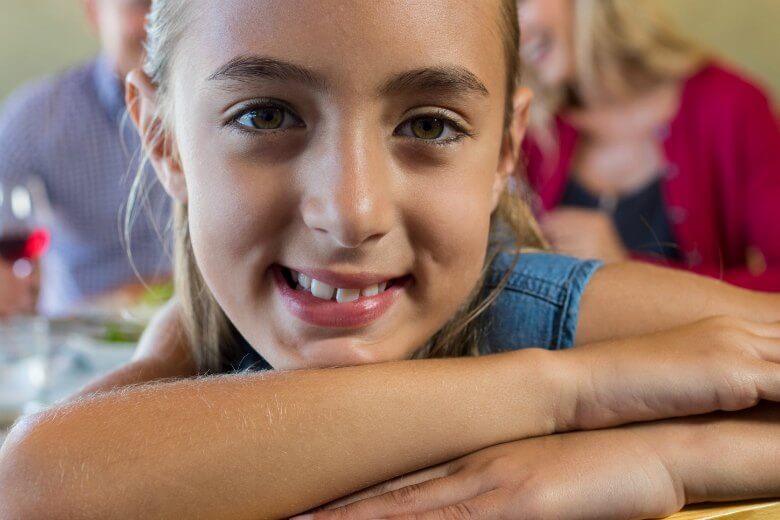
HOPE — 4-Step Guide for Positive Parenting Tweens and Teens
I thought about this interaction for days afterward. I realized that as your child gets older a big part of parenting is watching your kids fail as you give them more and more responsibility. And that is hard.
That mom was super upset because she is in the difficult spot of wanting her kids to take responsibility for things, but yet feeling like she failed as a parent when it didn’t work out.
I also realized that the main tenets of positive parenting still apply to older kids and tweens, but that it might look a little different. It is still important to acknowledge emotions, to connect, and to teach them — but how we do that changes as our kids grow.
Most of all, accidentally eavesdropping on this conversation gave me a lot of HOPE for the future as I see using these strategies will help to keep the parent-child relationship strong in the teenage years.
HOPE is the acronym I am using for positive parenting older kids.
Acronyms for parenting strategies are great because it helps you remember
Related: 3 Simple Steps to Positive and Effective Discipline: Are you Reacting or Responding to Your Child?
Hold Space for Their Emotions
The first step in positive parent-child interactions is to accept, acknowledge, and hold space for the emotions.
At the pizza restaurant, I heard the mom say the technically correct words to her daughter
“That’s fine, you can be upset,” or “You can be mad all you want to.”
The words were not an outright dismissal of her daughter’s emotions, but they weren’t quite true acceptance either.
True acceptance of big emotional displays is hard to do — big emotional displays make us uncomfortable.
Tweens and teens are definitely going to know when you don’t really mean what you say.
Think about this as actually providing a physical space for your child’s emotions.
Maybe pause in the parking lot before coming into the restaurant and tell your child that it is okay to be upset.
“It’s okay to be upset. We will talk about it and we will problem solve together, but for right now, it’s okay to feel how you feel. Lean into your emotion, feel it, and when you start to feel it passing, let it go. Breath into it.”
Hold that space open for them to feel. Teach your child to truly sit with the emotion and process it.
For more things to say in this step, see this article and printable: 10 Empowering Things to Say to Your Kid Instead of “Calm-Down”
Holding physical space for your child’s emotions will help them learn to process emotions and preserve and strengthen the parent-child bond as you go into a difficult conversation.
You are saying to them — I accept how you feel and how you were affected by this and I’ll be here as you process your emotions.
Own It:
The moment that turned the whole interaction around for that mom and her daughter is when the
That admission took the tension out of the interaction. It was as if the daughter realizes her mom really cares. Yes, she was upset, but because she cares. S
Own your feelings. Own your role in the situation, your part in it.
Here are some ways to “own it:”
“It’s your responsibility, but I could help you come up with a better way to remember things.”
“I’m really upset too. This is not what I wanted either. I am frustrated that this happened. I am upset because I care.”
Owning it and expressing that shows that you are human, that you are regulating your own emotions, and that you care.
This will help keep that connection between parent and child positive and strong during the teenage years — they want to hear how you feel, that you aren’t perfect either, most of all they want you to be real.
Problem-solve Together:
The problem still exists once you have gotten through everyone’s emotions.
This is where the hard work comes in — but also the life lessons. Maybe your child needs help thinking about how to apologize to a friend in a sincere way.
Maybe something can be done to change the outcome of a situation.
Maybe a system needs to be put in place so your child can remember their responsibilities better.
Maybe there needs to be some kind of check-in or calendar or maybe it’s time to start teaching your tween about the power of lists, time-management — about how to conquer procrastination.
Sometimes we expect a lot from our kids and we realize we haven’t quite given them the tools to get it done. Here are some books for possible issues at this age: Positive Behavior Book Series for 8 to 13-year-olds
And here are some books specifically about motivation, time-management, and organizational skills — which I imagine may account for a lot of the angst in the tween and teen years.
Smart but Scattered Teens: TheTo-Do List Formula: A Stress-Free Guide To Creating To-Do Lists That Work!The 7 Habits of Highly Effective TeensThe Manual to Middle School: The “Do This, Not That” Survival Guide for GuysA Smart Girl’s Guide: Middle SchoolWeird But True Daily Planner: 365 Days to Fill With School, Sports, Friends, and Fun!
Empathize
Being real about how you feel and owning that, opens up the thread of connection between you and your child — before you let this go, take the time to really strengthen that thread. Show them some empathy.
In the end, yes, the daughter messed up — but the outcome affected her — her friend couldn’t come to an important event. As the parent, this disappoints you on so many levels but, show your child that you feel for them.
Tell them about a time you did something similar and felt that kind of disappointment. Reinforce the idea that we all mess up — and we all get disappointed. Tell them about a time something was really hard for you and then tell them — I’ll be here for you in this.
Be there in that hard moment, as uncomfortable and as frustrating as it is, don’t leave them alone when things get hard.
This doesn’t mean you take care of it and solve it for them — a big part of your role as a parent is helping them develop independent problem-solving skills — life skills, but you can still be there when they are at their lowest.
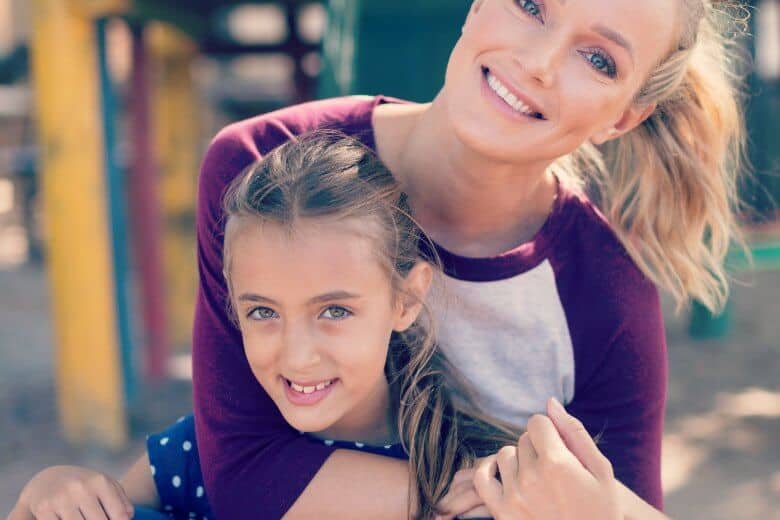
Holding space for your child’s emotions, owning your role in it and your own emotions, problem-solving together, and empathizing is a formula for positive parenting tweens and teens that can be applied to pretty much any parent-child interaction.
Following this formula will not only help you parent your older child positively but will strengthen your bond with them — even during the tween and teen years.
Click below for a printable of this post.
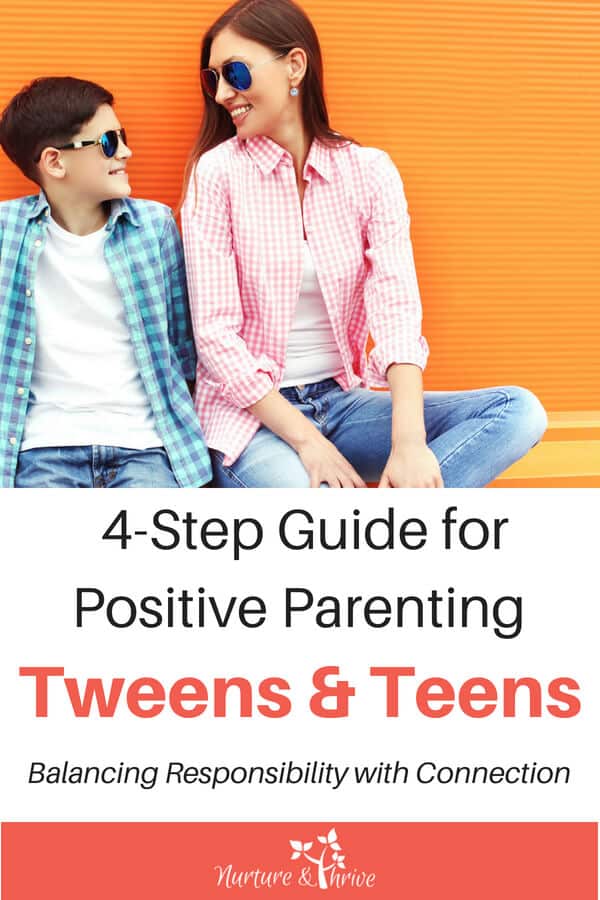
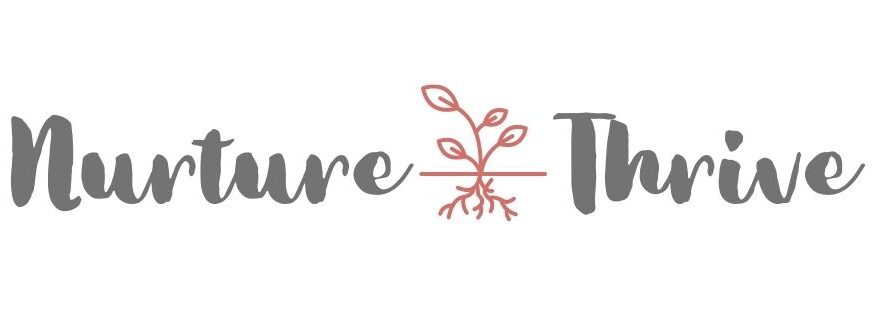

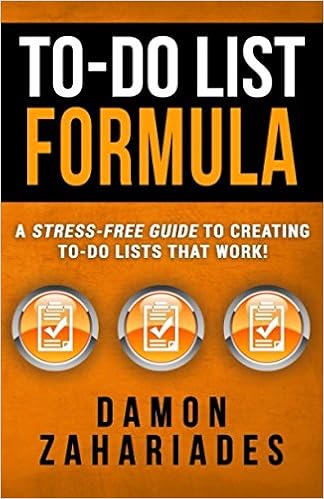



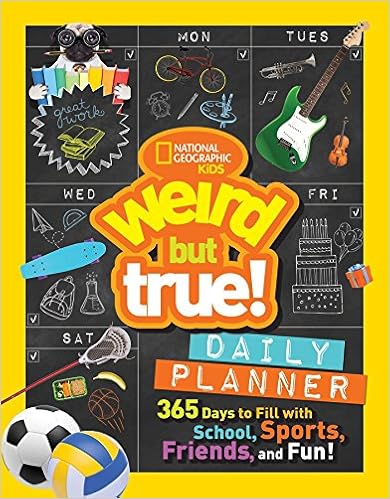
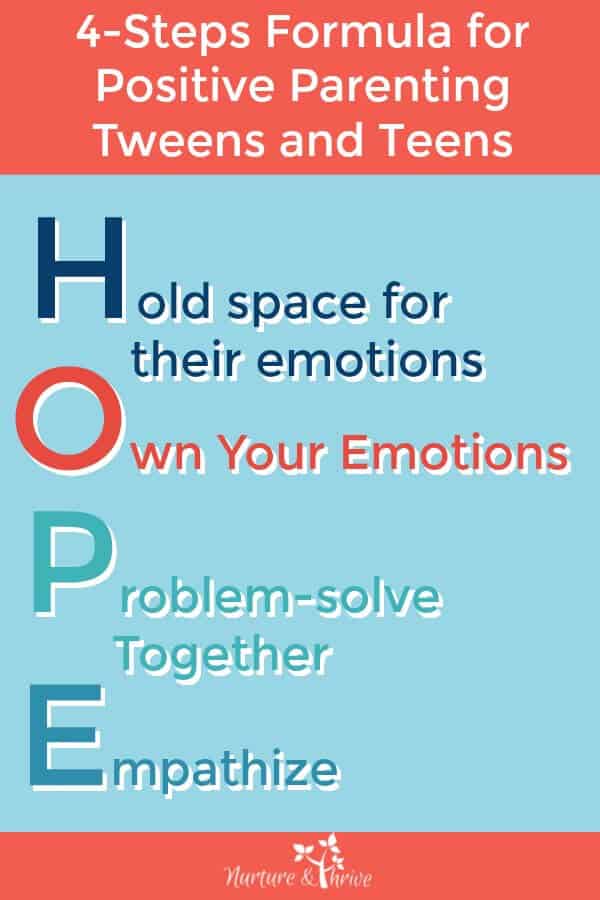
 How to Be More A More Playful Parent and Connect With Your Child
How to Be More A More Playful Parent and Connect With Your Child